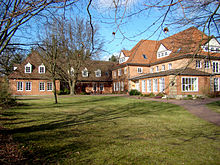Folk high school
Heimvolkshochschulen ( HVHS ) are special adult education institutions that offer their educational events exclusively or predominantly in the form of courses lasting several days or several weeks with shared accommodation and meals ( boarding school ). In order to ensure a "learning-promoting distance from the stresses of professional and private everyday life", folk high schools are often located in rural areas away from the big cities, in contrast to normal adult education centers.
history



The idea of the folk high school has its roots in Scandinavia, especially in Denmark : In 1844, the first folk high school was founded in Rödding, Jutland, according to the ideas of pastor and educator Nikolai Frederik Severin Grundtvig (1783–1872). After the German-Danish War , the school was moved to Askov in 1865 . These early folk high schools usually offered several weeks of courses with accommodation and meals over the winter and were mainly aimed at young adults from the countryside. Living and learning together should strengthen the pupils’s identity and personal responsibility. Such folk high schools for young people between the ages of fourteen and eighteen are known today in Denmark as Efterskoler (after-schools).
The first German folk high schools based on the Danish model were established in Schleswig-Holstein, namely in Tingleff (1905; today Denmark), Albersdorf (1906), Mohrkirch-Osterholz (1907) and Norburg (1911). In 1919 the Lower Saxony Lutheran Folk High School was founded in Hermannsburg ; it is the oldest Protestant folk high school in Germany and still exists today. Further foundings followed in the 1920s, e.g. B. on March 7, 1920 the Heimvolkshochschule Tinz . They were particularly popular as training centers in the workers ' and workers' youth movement , but also in church education. In 1926, the Christian Farming College in Markenhof was opened on the Markenhof near Kirchzarten , which had been cooperating with the Baden Farming School at Ittendorf Castle, which was founded in 1931, since 1932 .
After the Second World War , there was a renewed wave of start-ups when, in addition to political education , the work of the folk high schools increasingly focused on attaining and catching up school qualifications and further training for young adults in rural areas. The type of a country folk high school , also called a country folk high school or rural home folk high school, was created, which aims its educational program particularly at people from rural areas or from agriculture. There are rural folk high schools with professional or church sponsorship; In the Association of Educational Centers in Rural Areas , 44 rural adult education centers are organized throughout the Federal Republic of Germany. Another focus of many folk high schools was and is cultural education. The offer of the Academy Waldschlösschen , which was founded in 1981 as a result of the gay movement and a folk high school recognized by the state of Lower Saxony, sets a new accent : With a large part of its seminars and conferences it is aimed at gays and lesbians.
Folk high schools are particularly widespread in Lower Saxony, they form the Lower Saxony State Association of Folk High Schools . In North Rhine-Westphalia they have joined forces with the academies to form the “Working Group of Educational Institutions and Academies (Folk High Schools) in North Rhine-Westphalia”.
Today most courses in folk high schools only last a few days, longer training courses have become rare. In the past decades, the folk high schools have become more differentiated and specialized as "educational institutions": Some maintain intensive contacts abroad, others rely on ecology, offers for personal development and team development, advanced training especially for educational, agricultural professions and voluntary work, seminars for parents and children , for gays and lesbians, working with people with disabilities or the concerns of the rural population.
The sponsorship is correspondingly broad. It ranges from churches, trade unions, professional, landscape and welfare associations to registered associations and foundations.
See also
Web links
- On the idea and history of the folk high schools
- Information from the Danish Ministry of Education
- Relevant guidelines of the Ministry of Culture Saxony-Anhalt (PDF file; 88 kB)
- Association of educational centers in rural areas - umbrella organization of folk high schools in Germany
- Lower Saxony regional association of folk high schools
- Working group of educational institutions and academies (folk high schools) in NRW eV
Individual evidence
- ↑ Home adult education center Leck (Ed.): 50 years HVHS Leck 1923-1973 . Leck 1973, p. 14.
- ↑ Norbert Vogel: Grundtvig's importance for German adult education . 1994, ISBN 3-7815-0757-2 , pp. 117 .
-
↑ Archive link ( Memento of the original from October 31, 2009 in the Internet Archive ) Info: The archive link was inserted automatically and has not yet been checked. Please check the original and archive link according to the instructions and then remove this notice. . Gustav Isernhagen: 75 years Heimvolkshochschule - 74 1/2 years association in Jürgen Schneider (Ed.): 75 years Lower Saxony Lutheran Heimvolkshochschule Hermannsburg - education for life , commission publisher Missionshandlung Hermannsburg 1994. Jan Friedmann: Search for meaning in the heath, Die Zeit, no. 8, February 12, 2004 .
- ^ Landesarchiv Baden-Württemberg: Archive unit General State Archive Karlsruhe 321 No. 671 . It contains documents about the facilities at the Markenhof and at Ittendorf Castle. The archival material can be viewed in digital form: https://www2.landesarchiv-bw.de/ofs21/suche/ , search term: Markenhof.
- ↑ Georg Etscheit, In the Middle of the Province . The Waldschlösschen Academy is the only state-recognized educational establishment for gays and lesbians , in: Die Zeit, No. 1, December 28, 2006, p. 69.
